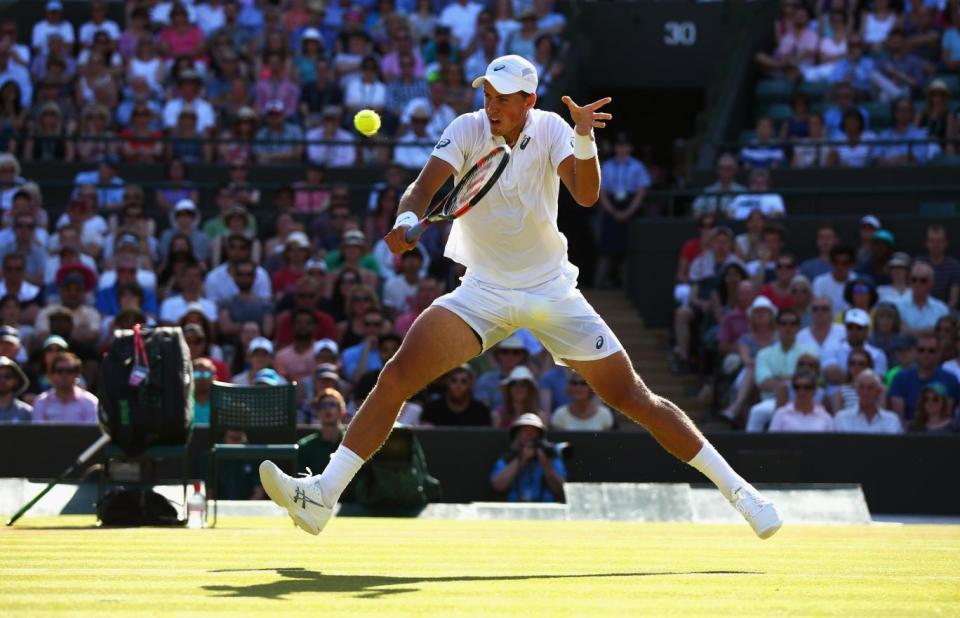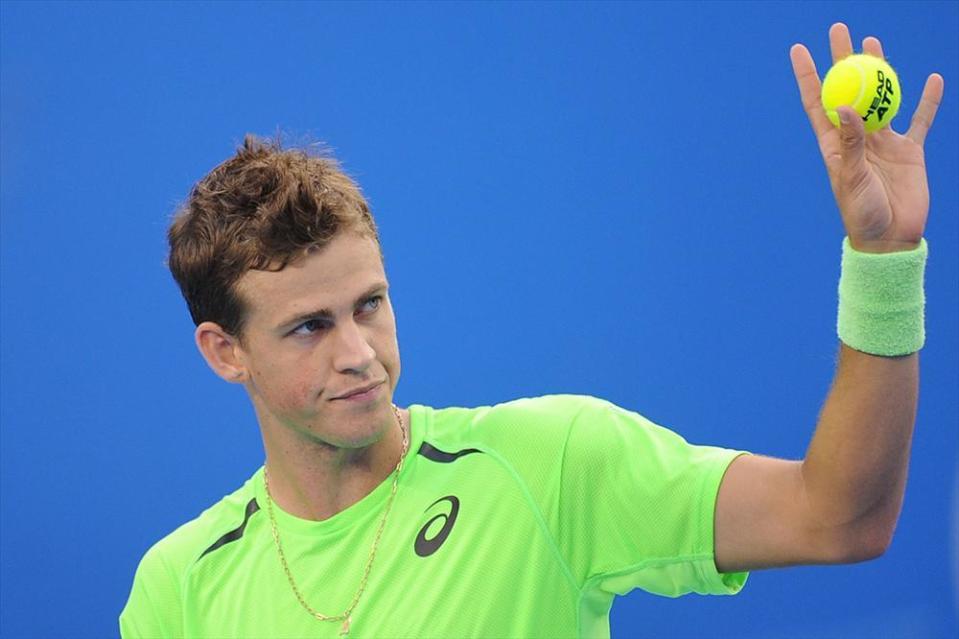How to eat and train like a Wimbledon tennis champion

Tennis. Arguably one of the most exciting sports to watch and one of the most fun to play, regardless of whether you’re more Murray or Mr Bean.
But whether you’re out on the courts on a weekly basis come rain or shine, or simply partial to a casual knock about during Wimbledon fortnight every year, there’s a lot we can learn about fitness, nutrition, dedication and ambition from the professionals who travel the world hitting balls back and forth across a net for a living.
One such man is Vasek Pospisil, a former Wimbledon doubles champion and Canadian No.2 tennis player. But even champions are always trying to improve.

Although yet to win a major tournament in the singles, a few months ago Pospisil made a big change that has made a huge difference to his game: “I changed my diet because I thought I could trim down and lose weight while boosting my energy,” he told The Independent.
The 27-year-old has switched to a strict diet, shunning dairy and gluten, although he admits to having a slight weakness for sweet treats, proving even top tennis tennis players are human like the rest of us.
“I should be sugar-free but that’s the area where I have some cheat moments,” Pospisil says. “You have to stay sane. I don’t eat a lot of sugar but I’ll have some dark chocolate in the evenings. I try not to go overboard though.”
And it’s helped him become a better tennis player:
“I feel better on the court, I’ve trimmed down, I have more energy and don’t have dips throughout the day,” Pospisil says. “It’s pretty stable. The diet is working for me so far but everybody is different.”
For instance, Novak Djokovic is famously coeliac and follows a largely vegan diet, and one could argue that it’s working well for him - he has spoken out before to say he credits his best season ever with switching to a strict diet.
As an athlete, protein is of course important. But apart from the meat in their diets, many top tennis players essentially follow the clean eating movement. (Although they’re less vocal about in on Instagram as some health and fitness fans.)
What does this look like on a daily basis though?
Safe to say I won't be eating anywhere else this week.. 🍣#addict #Chengdu
A post shared by Vasek Pospisil (@vasek.pospisil) on Sep 23, 2016 at 6:10am PDT
For Pospisil, a match day would start with a breakfast of three to four scrambled eggs with avocado, a little sweet potato and some fruit - quite the change from the porridge and cereals he used to eat.
If he has a mid-afternoon match, breakfast is followed by practice and then a lunch of sweet potato with salmon or chicken to provide slow-release energy.
“I try to finish a meal two hours before a match then snack a little on a banana and some nuts,” Pospisil says.
If you want to play well, it’s important to give your body time to digest your food so you’re not too heavy on court: “I have to let the stomach digest and the blood return to the rest of the body,” he explains. “When you’re digesting, the blood goes to the stomach and it’s important to be sharp on the court.”
During matches, Pospisil snacks on more bananas and nuts, which is a change from the energy gels he used to consume: “I’m trying to stay away from packaged, high sugar energy so I don’t dip afterwards,” he says.
“After a match I have an electrolyte amino acid mix and I try and take that immediately afterwards to help the muscles recover.”
Having finished a gruelling match, you’d be forgiven for thinking all a player would be capable of doing is lying on the floor in a starfish position, but unfortunately that’s not an option for the professionals.
Nope, it’s on to an exercise bike for 15 minutes to cool down. Followed by a stretching routine with a physio. And only then is it time for food.
Oh, and after that it’s back to the physio for an hour and a half of massage. Followed by an ice bath. I know.
So yes, a slightly longer routine than the ten minutes of stretching you do after a gym sesh.

And there’s no indulging in never-ending bowls of pasta post-workout for the professionals either - Pospisil says that an evening meal for him tends to consist simply of meat and veggies.
“It’s a strict diet these days but it’s good,” he admits. After all, you don’t get to the top without putting in the work.
That’s not to say top tennis players never indulge though - Pospisil reveals that if he could eat whatever he wanted, it would be “a good burger and fries or pizza.”
And with a strict diet comes, as you’d expect, an impressive training regime.
As tennis is so dynamic, players do a little bit of everything: “You have to have endurance, you need to be fast, have explosive footwork, and be strong all round,” Pospisil explains.
He trains on and off the court, working on his footwork and keeping sharp with ladders during tournaments, and focusing more on endurance and HIIT (high intensity interval training) between events.
It’s actually not usually in a tennis player’s best interests to bulk up: “I’m not trying to gain muscle because it’s important to be light on the court and very efficient,” Pospisil explains.
“For me, I try to be strong but as lean as possible - the less weight you carry around the court the better, because you’re always changing direction. You want to be light and quick.”
But whether you’re a professional tennis player or not, there’s a lot of value in mixing up your training, combining cardio and resistance, and many people find it’s the best way to maximise fat loss.
Most importantly however, especially with the rise of people burning out through over-exercising and pushing themselves too hard, is to take rest days.

“You definitely need them for both the body and psychologically - you need to be fresh. If you’re not ready to give 100 per cent in the gym or on the court you’re never going to get as much from your training,” Pospisil says, admitting that he probably only manages to have a day off once every two weeks or ten days.
“Recovery is important. Playing tournaments for three or four weeks in a row is emotionally and physically exhausting so having a day off is really helpful.”
The recipe for fitness success? Cardio and resistance training, rest days, eggs for breakfast and a little dark chocolate before bed. And maybe the occasional burger.


